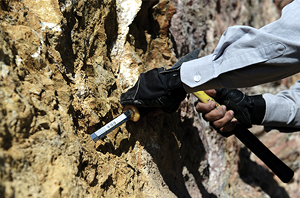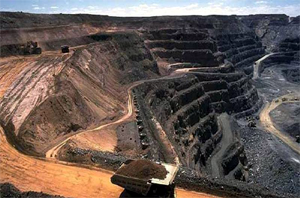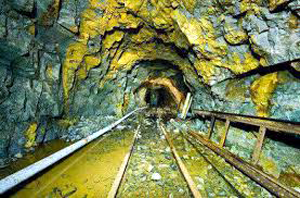Mining is one of the most progressive industries today based on its reliance on the state-of-the-art technology for the provision
of basic raw materials to other industries. Mineral sector is playing a crucial role in the economic uplift of the Province. It provides raw materials
for a number of mineral based industries including construction, power, mechanical, electrical, ceramics, paints, etc.
The graduates of this department are employed in the public sector including Mines and Minerals Development Department,
Pakistan Mineral Development Corporation (PMDC), Oil and Gas Development Corporation Ltd (OGDCL), Pakistan Stone Development Company (PASDEC),
Pakistan Atomic Energy Commission (PAEC) and various other private organizations like cement manufacturing operations and other mining related project.
- Mission of the Department of Mining Engineering
The mission of Mining Engineering Department is stated as under:
"To produce highly qualified, well rounded mining professionals leading the mining industry
for development of society through knowledge based economy and extending innovation and
research competitiveness at national and international level."
- Academic Programs
- - B.Sc. Mining Engineering
- - M.Sc. Mining Engineering
- - Ph.D. Mining Engineering
- Field Visits
- Survey Camp
- Laboratories The Department is equipped with following laboratories:
- - Mineral Processing Laboratory
- - Surveying Laboratory
- - Rock Mechanics Laboratory
- - Geology Laboratory
- - Ventilation, and Safety Laboratory
- - Computer Laboratory
Program Educational Objectives (PEO's)
Mining Engineering Department aims to produce graduates who possess/exhibit the following capabilities after four years of graduation.
PEO 1: Demonstrate skills to solve problems of Mining and Mineral based industries.
PEO 2: Perform in Management and Leadership roles for Growth in Mining and Mineral industry.
PEO 3: Apply Engineering Knowledge and Skills for Development of Society.
PEO 4: Pursue Higher Studies, Demonstrating actively involvement in life-long learning.
Program Learning Outcomes (PLO's)
The Department of Mining Engineering aims to instill in our graduates the following attributes:
1. Engineering Knowledge
An ability to apply knowledge of mathematics, science, engineering fundamentals and an engineering specialization to the solution of complex engineering problems.
2. Problem Analysis
An ability to identify, formulate, research literature, and analyze complex engineering problems reaching substantiated conclusions using first principles of mathematics, natural sciences and engineering sciences.
3. Design / Development of Solutions
An ability to design solutions for complex engineering problems and design systems, components or processes that meet specified needs with appropriate consideration for public health and safety, cultural, societal, and environmental considerations.
4. Investigation
An ability to investigate complex engineering problems in a methodical way including literature survey, design and conduct of experiments, analysis and interpretation of experimental data, and synthesis of information to derive valid conclusions.
5. Modern Tool Usage
An ability to create, select and apply appropriate techniques, resources, and modern engineering and IT tools, including prediction and modeling, to complex engineering activities, with an understanding of the limitations.
6. The Engineer and Society
An ability to create, select and apply appropriate techniques, resources, and modern engineering and IT tools, including prediction and modeling, to complex engineering activities, with an understanding of the limitations.
7. Environment and Sustainability
An ability to understand the impact of professional engineering solutions in societal and environmental contexts and demonstrate knowledge of and need for sustainable development.
8. Ethics
Apply ethical principles and commit to professional ethics and responsibilities and norms of engineering practice.
9. Individual and Teamwork
An ability to work effectively, as an individual or in a team, on multifaceted and /or multidisciplinary settings.
10. Communication
An ability to communicate effectively, orally as well as in writing, on complex engineering activities with the engineering community and with society at large, such as being able to comprehend and write effective reports and design documentation, make effective presentations, and give and receive clear instructions.
11. Project Management
An ability to demonstrate management skills and apply engineering principles to one's own work, as a member and/or leader in a team, to manage projects in a multidisciplinary environment.
12. Lifelong Learning
An ability to recognize importance of, and pursue lifelong learning in the broader context of innovation and technological developments.
Field visits to Mining Engineering projects of national importance are arranged for students. Each year students and concerned faculty members visit different mining industries with a high technical merit.
Survey Camp for the students of Mining Engineering Department is arranged each year for a period of three weeks after 7th semester. The course includes hands-on work in contouring, triangulation, fly leveling and plane tabling.
Research
Faculty research is actively pursued in the Department. Faculty members have been working on a number of research projects of
national importance. Solution of mineral industry's real problems is the primary focus of current research. These projects include
the development of improved mine planning and design as well as processing techniques.
Improvement of working conditions and occupational health and safety in mines is another important area of research. Students both at undergraduate and postgraduate levels actively participate in these research projects under faculty supervision.



